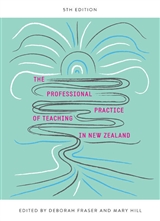Click on the cover image above to read some pages of this book! Teaching Primary Science Constructively helps readers to create effective science learning experiences for primary students by using a constructivist approach to learning. This best-selling text explains the principles of constructivism and their implications for learning and teaching, and discusses core strategies for developing science understanding and science inquiry processes and skills. Chapters also provide research-based ideas for implementing a constructivist approach within a number of content strands. Throughout there are strong links to the key ideas, themes and terminology of the revised Australian Curriculum: Science.
This sixth edition includes a new introductory chapter addressing readers' preconceptions and concerns about teaching primary science. Primary science: every teacher, every child 2. Constructivist views of learning and teaching science 3.
Implementing the Australian Curriculum: Science with a constructivist mindset 4. Thinking and working scientifically 5. Electricity 7. Movement and force 8. Living things and environments 9.

Booktopia has Teaching Primary Science Constructively, 4th Edition by Keith Skamp. Dvdfab 8 qt free trial. Buy a discounted Paperback of Teaching Primary Science Constructively online from Australia's leading online bookstore.
Living things: science and design and technologies 10. Materials and their properties 11.
Physical and chemical change 12. Our place in space 13.
Our planet Earth 14. Weather and our environment Coda Appendix 1: At a glance: key teaching and learning strategies and other pedagogical topics Appendix 2: At a glance: key content knowledge.
Teaching Primary Science Constructively helps readers to create effective science learning experiences for primary students by using a constructivist approach to learning. Introductory chapters explain the principles of constructivism and their implications for learning and teaching. Core strategies for the development of science understanding and science inquiry processes and skills are also discussed. Subsequent chapters then provide research-based ideas for implementing a constructivist approach within the key content strands covered in most primary science syllabuses. This substantially revised fourth edition details how constructivist emphases have changed in recent years and explores the implications for learning and teaching. Chapters contain the latest research on learning through student-generated representations, engaging student interest, and focussing on the nature of science, along with ideas on how to integrate these and other processes and topics into teaching sequences. There is an increased emphasis on teaching about ‘science as a human endeavour’ throughout, including discussion and examples of socioscientific issues, different ‘ways of knowing’ and science in our everyday lives.
Keith Skamp is an Adjunct Professor in the School of Education at Southern Cross University. He has been a lecturer in undergraduate and graduate units in science education, environmental education and research methodology for many years and has led or been involved in professional and curriculum development initiatives in primary science at state, national and international levels. His research and consultancy in science and environmental education has included working with the Australian Academy of Science’s Primary Connections initiative, as well as for State and federal governments, and has resulted in numerous refereed journal articles and other publications; currently his research focuses on students’ responses to global warming.
Latest Posts
- Saw Pc Game Crack Files
- Baza Dannih Access Magazin Igrushek
- Download Apostle Johnson Suleman Books Pdf Free
- Torrent Mame 32 Full Version4749589
- Iar Embedded Workbench For Renesas Rl78 Keygen
- Software Tango Pcb Software
- Download Call Of Duty Modern Warfare 2 Rar Password
- Servisnij Rezhim Shassi Mc 049b
- Download Game Chess Gratis Untuk Hp
- Metan Zapravki Germaniya Karta
- Download Buddha Hoga Tera Baap 2011 Full Movie Free
- Fsx P3d Flight1 Uiver Douglas Dc 2
- Icon Pc Anime Untuk Folder Keren